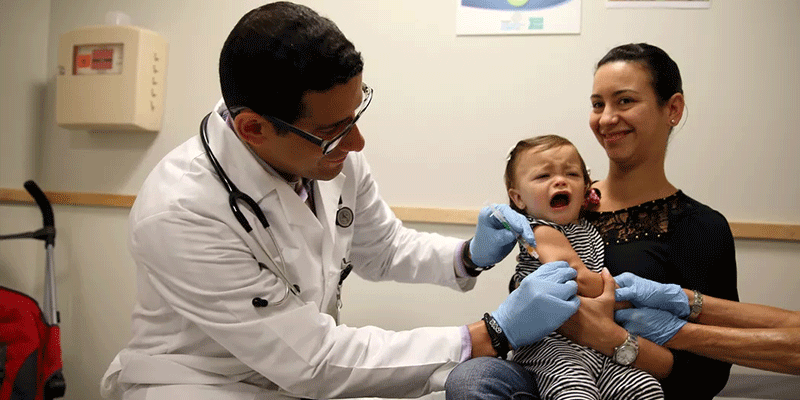
When will your baby‘s next exams take place?
Pediatricians routinely examine newborns and talk with parents before the babies are discharged from the hospital. Many pediatricians will check the baby every day that the newborn is in the hospital, and then will conduct a thorough exam on the day of discharge. During these exams, the doctor can identify any problems that may have come up, while also giving parents a chance to ask questions that occurred to them during the hospital stay. Your pediatrician also will let you know when to schedule the first office visit for your baby and how to reach her if a medical problem develops before then.
All babies also should begin their immunizations before leaving the hospital. The first and most important “immunization” is starting to breastfeed your baby as soon as possible after the baby is born. This provides some early disease protection for your baby. The second recommended immunization is the first dose of the hepatitis B vaccine, which is given as a shot in the baby’s thigh. Your baby will receive the next series of vaccinations when he is six to eight weeks old.
When is the doctor available by phone? E-mail?
Some pediatricians have a specific call- in period each day when you can phone with questions, while others will return calls as they come in throughout the day. If members of the office staff routinely answer these calls, consider asking what their training is. Also ask your pediatrician for guidelines to help you determine which questions can be resolved with a phone call and which require an office visit. Some pediatricians prefer using e-mail to communicate. While you may have some concerns about discussing issues in this way, overall it can help foster your relationship with the doctor.
What hospital does the doctor prefer to use?
Ask the pediatrician where to go if your child becomes seriously ill or is injured. If the hospital is a teaching hospital with interns and residents, find out who would actually care for your child if he were admitted.
What happens if there is an after-hours (nighttime or weekend) concern or emergency?
Find out if the pediatrician takes her own emergency calls at night. If not, how are such calls handled? Also, ask if the pediatrician sees patients in the office after regular hours, or if you must take your child to an emergency department or urgent care center. When possible, it’s easier and more efficient to see the doctor in her office, because hospitals often require lengthy paperwork and extended waits before your child receives attention. However, serious medical problems usually are better handled at the hospital, where staff and medical equipment are always available.
Last Updated 11/12/2009
Source Caring for Your Baby and Young Child: Birth to Age 5 (Copyright © 2009 American Academy of Pediatrics)
The information contained on this Web site should not be used as a substitute for the medical care and advice of your pediatrician. There may be variations in treatment that your pediatrician may recommend based on individual facts and circumstances.






